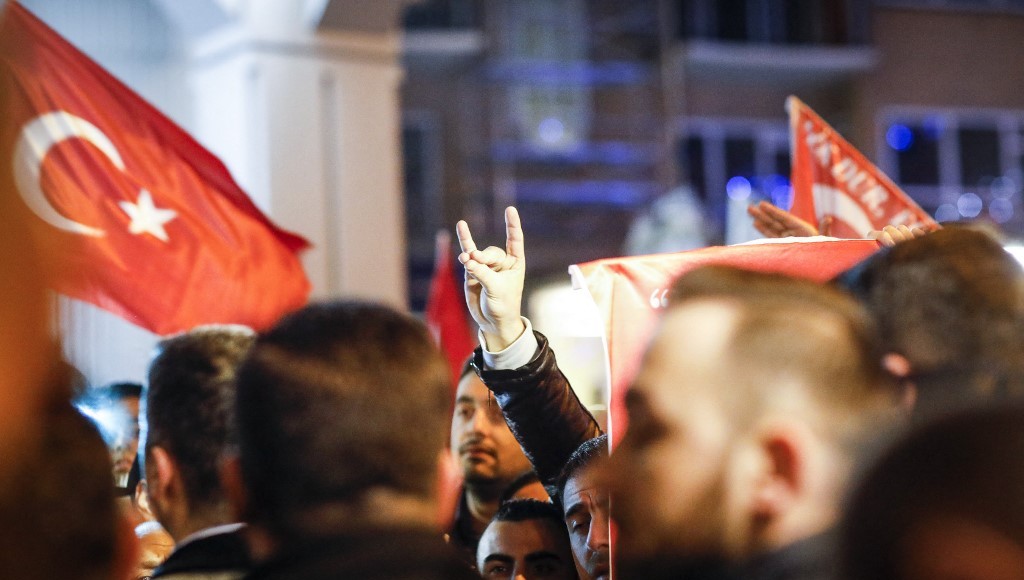Cevheri Güven
A study conducted by Professor Kemal Bozay from the University of Cologne for the Berlin office of the American Jewish Congress (AJC) found that with a local membership of some 18,500 people, the Turkish Grey Wolves (Ülkücüler) is one of the most powerful far-right groups in Germany. According to the study, the group’s ideology is based on anti-Semitism and racism as well as hatred of Turkey’s minorities, posing a threat to Jews, Kurds, Alevis, Armenians and other minority groups. Often a subject of debate at the Bundestag, the network was banned in France last year. In Turkey, the movement is at the highest point of its power in the last 40 years.
Established on the basis of Turkish nationalism, Islamism and the assertion that everyone living in Turkey is Turkish, the group has constituted the country’s most prominent extreme right political movement since the 1950s. Founded by Alparslan Türkeş, a colonel who took part in a successful military takeover in 1960, the group set up one of Turkey’s oldest political parties. The Nationalist Movement Party (MHP) is led by Devlet Bahçeli, and it is currently a governing ally to President Recep Tayyip Erdoğan.
Bahçeli, who took office as leader following Türkeş’s death, has twice made his party a governing partner. With the partnership with Erdoğan, the party has become more powerful than ever. Grey Wolves-linked individuals filled the public sector jobs vacated after Erdoğan’s massive purge of civil servants who were profiled as government critics, most notably the faith-based Gülen movement. While Erdoğan’s ruling Justice and Development Party (AKP) dealt with public tenders, defense industry purchases and foreign policy issues; the MHP focused entirely on bolstering its presence in the bureaucracy. Key posts in law enforcement are particularly controlled by members of the group, which is also highly influential in the judiciary.
Interior Minister Süleyman Soylu, despite being an AKP official, is widely seen as the MHP’s representative within the cabinet. Last year Soylu had resigned amid tensions with Erdoğan over a botched curfew during the early phases of the COVID-19 pandemic. Pressured by the MHP, Erdoğan rejected his resignation.
After entering the cabinet, Soylu was also at odds with Berat Albayrak, Erdoğan’s son-in-law, so much so that he had once deliberately shouldered him in front of the cameras. The tensions continued until Albayrak’s resignation as treasury and finance minister last October. It is difficult to point to a second minister in the cabinet who would be able to mount such a challenge to Erdoğan or a member of his family. While Soylu has distinguished himself as a potential alternative leader with these challenges, it is clear that he was able to do this thanks to the MHP’s support.
The rise of Grey Wolves-affiliated staff within law enforcement and the judiciary gave way to a renewed prominence of mobs close to the group. Bahçeli paid a visit to Alaattin Çakıcı, arguably Turkey’s most powerful mob boss, while he was in prison, and he successfully pressured Erdoğan into enacting special legislation that secured Çakıcı’s release. Shortly after leaving prison, Çakıcı began coordinating Turkey’s underground networks, and he repeatedly threatened main opposition leader Kemal Kılıçdaroğlu.
With the immunity provided by the political support, the Grey Wolves have taken control of the streets, bringing about an onslaught of violent attacks reminiscent of the 1980s. Today, criticizing Bahçeli requires risking an assault by the Grey Wolves. More than 10 journalists and politicians were the victims of such attacks that came on the heels of their critical remarks about the MHP leader. The reluctance of the police and prosecutors to pursue the assailants is indicative of the power that the MHP wields in both areas of the bureaucracy.
One of the victims was Selçuk Özdağ, the deputy chairperson of the Future Party (GP), who in his first statement after the incident said it happened because of the criticism he leveled. Özdağ also said the attackers were armed. Although their identity was revealed and they turned out to be members of the Grey Wolves’ Ankara office, no arrest warrant has yet been issued.
The extremist group also aims to project its power outside Turkey, and earlier this year they succeeded in making progress towards that end. The Cologne-based Union of International Democrats (UID), known as Erdoğan’s largest network in Europe that was traditionally headed by people with conservative or Islamist backgrounds, underwent a significant change in management in January, when the Grey Wolves-linked Köksal Kuş became its chairman. In the 1980s Kuş had fled Turkey to seek refuge in Germany after Turkish police began carrying out operations to counter the Grey Wolves following violent leftist-rightist turmoil across the country.
In Germany the Grey Wolves have a variety of associations and NGOs whose membership totals 18,500 people. According to Deutsche Welle, the Federal Office for the Protection of the Constitution (LfV), Germany’s federal domestic intelligence agency, in its latest report said that in addition to the structured networks, there are nearly 2,800 individual Grey Wolves affiliates who do not have official membership in the associations but who maintain online contact with them and share their ideology. The report also indicates that the group spreads racial supremacy propaganda online and defines Kurds, Armenians, Greeks, Jews and Americans as hostile groups.
In Turkey, in addition to these, the Grey Wolves have recently been targeting the Syrian refugees hosted in the country.

